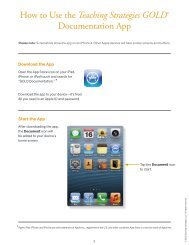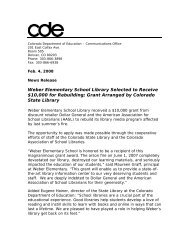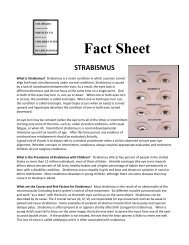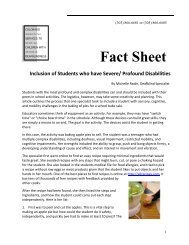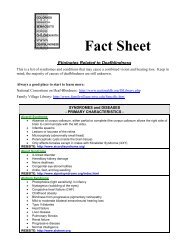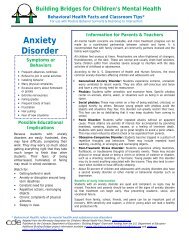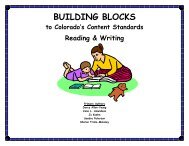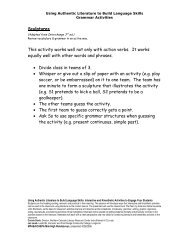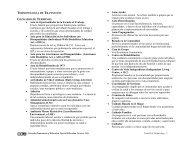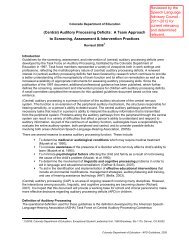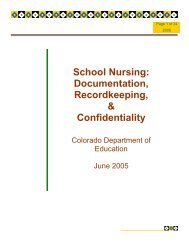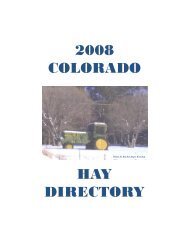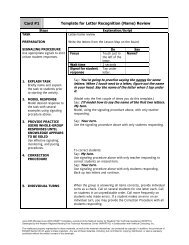ONLINE EDUCATION INTERIM REPORT - Colorado Department of ...
ONLINE EDUCATION INTERIM REPORT - Colorado Department of ...
ONLINE EDUCATION INTERIM REPORT - Colorado Department of ...
You also want an ePaper? Increase the reach of your titles
YUMPU automatically turns print PDFs into web optimized ePapers that Google loves.
22<br />
7. RECOMMENDATIONS<br />
Through its public forum, written communications from the public, and feedback from<br />
community groups, the task force has learned <strong>of</strong> the need for innovation, access, alternative<br />
delivery models and advancement in education funding models. It is a delicate, but necessary<br />
task, to balance education funding systems with accountability and student choice. Our common<br />
interest <strong>of</strong> educating students can be overshadowed when systems become threatened by fi nancial loss.<br />
It is with great hope that, as a result <strong>of</strong> a more longitudinal focus on learning gains, fewer children will<br />
be left behind and neglected in their current settings. Even so, it is clear to this task force that there are<br />
some students who will continue to struggle in the traditional system undetected and thus never reach<br />
their full potential. The great potential <strong>of</strong> individualized learning as provided through the online delivery<br />
method may close this gap.<br />
Further study <strong>of</strong> online education should be pursued to inform later policymaking. Many issues cannot<br />
be addressed adequately in the short-term, but should be considered after further study through<br />
an inclusive, transparent process. Issues requiring further examination include accountability and<br />
oversight, and funding <strong>of</strong> online programs. Specifi cally, the task force recommends:<br />
• A study <strong>of</strong> why students leave their physical schools for online schools<br />
• A collaborative study to develop best practices for online education by engaging online<br />
education practitioners, the authorities that oversee them, and the families and students that<br />
choose online education.<br />
• A thorough review and analysis <strong>of</strong> recent innovation and performance in education throughout<br />
the state, to identify and replicate what works, describe and address what doesn’t, and<br />
understand the factors and circumstances that help or hinder such reform efforts.<br />
In addition to these issues requiring further study, the following recommendations should be<br />
considered immediately:<br />
1) Consider multiple meanings <strong>of</strong> the term “at-risk,” including students who are behind<br />
academically, when comparing online student outcomes to students in physical schools and<br />
when evaluating the effi cacy <strong>of</strong> schools in general;<br />
2) The State Board <strong>of</strong> Education rather than the legislature should defi ne “complete educational<br />
program,” do so in a way that allows for innovation, and consider its application to online<br />
schools and learning centers;<br />
3) Clarify the application <strong>of</strong> rules and requirements for online learning centers in a way that does<br />
not discourage online schools from using learning centers to serve at-risk students;<br />
4) Encourage the sharing, documenting, and clarifying <strong>of</strong> performance indicators;<br />
5) Clarify the roles and responsibilities <strong>of</strong> online educators;<br />
6) Encourage state and/or district cooperation for the CSAP testing for online students;<br />
7) Examine options for a state inter-district entity for online school accountability such as CSI, the<br />
<strong>Colorado</strong> <strong>Department</strong> <strong>of</strong> Education, or BOCES;<br />
8) Remove the current funding restriction that mandates enrollment in a public school in at least<br />
one semester <strong>of</strong> the previous year for online students;<br />
9) Provide the state PPR average for online students or a consistent and reasonable amount <strong>of</strong>



